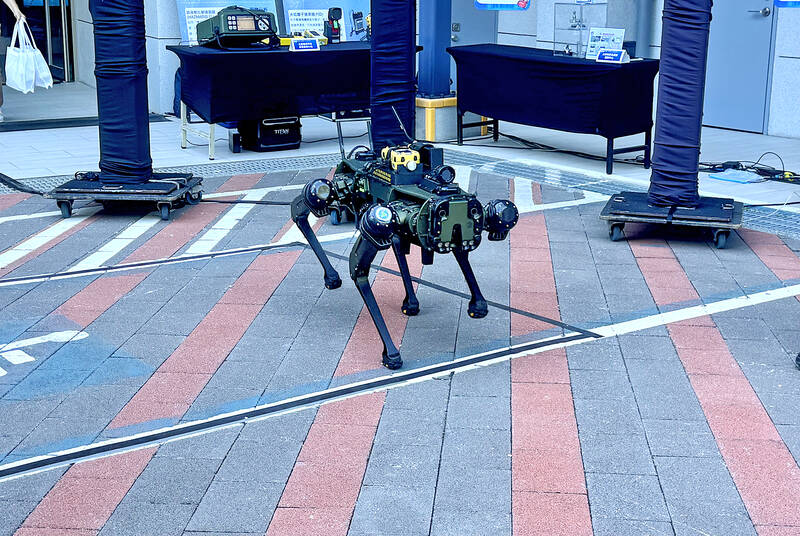The Ministry of Environment yesterday unveiled a robot dog that can assist in dealing with chemical emergencies, as well as enhance detection and safety.
Deputy Minister of Environment Hsieh Yein-rui (謝燕儒) said the robot dog, which was purchased from the US, weighs 51kg and costs about NT$15 million (US$492,805).
The robot was introduced under the ministry’s program to bolster chemical substance management, and improve chemical emergency preparedness and response, he said.

Photo: Huang Yi-ching, Taipei Times
The ministry hopes to purchase two more by 2029, so that the northern, central and southern chemical emergency response centers would all have one, Hsieh said.
The goal is to equip each of the 10 environmental incidents specialist teams across the three centers with one search-and-rescue robot dog, if budget allows, he added.
The US import should also encourage domestic research and development of robot dogs, thereby lowering costs, he said.
Chemicals Administration Acting Director-General Chen Shu-ling (陳淑玲) said that unknown chemicals are the primary risk at chemical emergency sites, and it is crucial to promptly and precisely identify the chemicals via detection technology.
“It can be peroxides, which require water to lower temperatures, or substances that are dangerous when wet, which cannot be exposed to even a drop of water,” she said.
The ministry will continue to introduce smart disaster prevention equipment and promote cross-department cooperation to build Taiwan into a leading Asian country in chemical emergency response, she added.
Chemicals Administration environmental incidents specialist Chuang Kai-an (莊凱安) said that chemical emergencies could require five hours to several days of search and detection.
While rescue personnel wearing protective suits cannot stay at chemical emergency sites for more than 30 minutes, uncrewed ground vehicles such as robot dogs can conduct detection work for four to six hours, he said.
That would reduce the frequency of personnel rotation and the risk of injury, Chuang said.
The robot dog can complement the currently serving multifunction detection robot, a crawler vehicle that can carry up to 150kg, but is not good at overcoming obstacles, he said.
Robot dogs are lightweight and can handle various obstacles, such as climbing stairs, Chuang said.
Given their efficiency, more robotic equipment would be introduced and applied in search-and-rescue efforts, he said.

A preclearance service to facilitate entry for people traveling to select airports in Japan would be available from Thursday next week to Feb. 25 at Taiwan Taoyuan International Airport, Taoyuan International Airport Corp (TIAC) said on Tuesday. The service was first made available to Taiwanese travelers throughout the winter vacation of 2024 and during the Lunar New Year holiday. In addition to flights to the Japanese cities of Hakodate, Asahikawa, Akita, Sendai, Niigata, Okayama, Takamatsu, Kumamoto and Kagoshima, the service would be available to travelers to Kobe and Oita. The service can be accessed by passengers of 15 flight routes operated by

MORE FALL: An investigation into one of Xi’s key cronies, part of a broader ‘anti-corruption’ drive, indicates that he might have a deep distrust in the military, an expert said China’s latest military purge underscores systemic risks in its shift from collective leadership to sole rule under Chinese President Xi Jinping (習近平), and could disrupt its chain of command and military capabilities, a national security official said yesterday. If decisionmaking within the Chinese Communist Party has become “irrational” under one-man rule, the Taiwan Strait and the regional situation must be approached with extreme caution, given unforeseen risks, they added. The anonymous official made the remarks as China’s Central Military Commission Vice Chairman Zhang Youxia (張又俠) and Joint Staff Department Chief of Staff Liu Zhenli (劉振立) were reportedly being investigated for suspected “serious

ENHANCING EFFICIENCY: The apron can accommodate 16 airplanes overnight at Taoyuan airport while work on the third runway continues, the transport minister said A new temporary overnight parking apron at Taiwan Taoyuan International Airport is to start operating on Friday next week to boost operational efficiency while the third runway is being constructed, the Ministry of Transportation and Communications said yesterday. The apron — one of the crucial projects in the construction of the third runway — can accommodate 16 aircraft overnight at the nation’s largest international airport, Minister of Transportation and Communications Chen Shih-kai (陳世凱) told reporters while inspecting the new facility yesterday morning. Aside from providing the airport operator with greater flexibility in aircraft parking during the third runway construction,

American climber Alex Honnold is to attempt a free climb of Taipei 101 today at 9am, with traffic closures around the skyscraper. To accommodate the climb attempt and filming, the Taipei Department of Transportation said traffic controls would be enforced around the Taipei 101 area. If weather conditions delay the climb, the restrictions would be pushed back to tomorrow. Traffic controls would be in place today from 7am to 11am around the Taipei 101 area, the department said. Songzhi Road would be fully closed in both directions between Songlian Road and Xinyi Road Sec 5, it said, adding that bidirectional traffic controls would